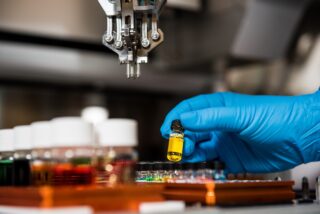HOME | ABOUT US | MEDIA KIT | CONTACT US | INQUIRE
HOME | ABOUT US | MEDIA KIT | CONTACT US | INQUIRE
Kansas State University has signed a new preclinical research and option agreement with Tonix Pharmaceuticals, a clinical-stage biopharmaceutical company, to develop a vaccine candidate for the prevention of COVID-19.

The inventor of the technology, Waithaka Mwangi, professor of diagnostic pathobiology in the K-State College of Veterinary Medicine, will direct the research.
The researchers have focused on the most critical protein of coronaviruses: the spike protein. When a person is exposed to the virus, this protein is involved in the infection of the host cell. The vaccine candidate developed at K-State has been engineered to display the spike protein in a manner that mimics the actual virus.
While the majority of vaccines that are currently being developed will be injected into the body, according to Mwangi, the best vaccine will be one that will trigger immune protection.
Instead of being injected, Mwangi’s vaccine candidate would be sprayed in the nose to trigger a response and block the virus’s spike protein from infecting the host cells. The vaccine will also induce T cell responses capable of killing infected cells.
The research agreement, coordinated through K-State Innovation Partners, is the fourth license agreement between K-State and corporate partners on technologies related to COVID-19.
“The team at K-State Innovation Partners enjoyed working with Dr. Seth Lederman and his team from Tonix to efficiently negotiate an exclusive, field-of-use option and sponsored research agreement to fund additional research at the Biosecurity Research Institute on Dr. Mwangi’s COVID-19 vaccine candidates,” Bret Ford, director of business development and licensing for K-State Innovation Partners, said. “The negotiations were approached with a high sense of urgency and we look forward to the company potentially commercializing our vaccine candidates to provide a solution for this global pandemic.”
Mwangi’s research will be conducted at the university’s Biosecurity Research Institute in Pat Roberts Hall, a biosafety level-3 facility.